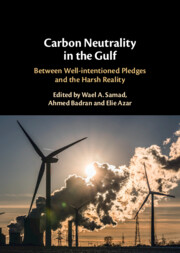Book contents
- Carbon Neutrality in the Gulf
- Carbon Neutrality in the Gulf
- Copyright page
- Contents
- Contributors
- Acknowledgments
- Abbreviations
- Part I Introduction
- Part II Circular Carbon Economy and Pathway Frameworks
- Part III Infrastructure
- 5 Energy Efficiency and Carbon Neutrality Potentials for the Building Sector in the GCC Region
- 6 Electrifying Public Transport Networks in Dubai
- 7 Net Zero Emissions in the GCC Region
- Part IV Policy and Data Transparency
- Part V Behavioural Aspects and Human Factors
- Part VI Conclusion
- Index
- References
7 - Net Zero Emissions in the GCC Region
Challenges and Opportunities for Green Hydrogen Applications
from Part III - Infrastructure
Published online by Cambridge University Press: 02 January 2025
- Carbon Neutrality in the Gulf
- Carbon Neutrality in the Gulf
- Copyright page
- Contents
- Contributors
- Acknowledgments
- Abbreviations
- Part I Introduction
- Part II Circular Carbon Economy and Pathway Frameworks
- Part III Infrastructure
- 5 Energy Efficiency and Carbon Neutrality Potentials for the Building Sector in the GCC Region
- 6 Electrifying Public Transport Networks in Dubai
- 7 Net Zero Emissions in the GCC Region
- Part IV Policy and Data Transparency
- Part V Behavioural Aspects and Human Factors
- Part VI Conclusion
- Index
- References
Summary
This chapter investigates the premise and potential benefits of green hydrogen (i.e. extracting hydrogen by using energy generated from renewable sources) for Gulf Cooperation Council (GCC) countries. These countries are currently researching and developing new technologies that will enable them to fulfil their international commitments to reducing carbon emissions and greenhouse gases. The aim of this chapter is to explain how green hydrogen – an energy source that produces environmentally friendly energy – works, the opportunities resulting from its application with regard to net zero emissions, as well as the challenges which may hinder its adoption in the GCC region. In addition to having favourable circumstances for producing green hydrogen, these countries’ vast oil reserves provide the hydrocarbons required to produce this innovative energy source. In this context, the green hydrogen industry’s prospects, constraints, as well as potential impacts on the GCC countries’ ability to meet net zero emissions goals and achieve carbon neutrality are studied.
- Type
- Chapter
- Information
- Carbon Neutrality in the GulfBetween Well-intentioned Pledges and the Harsh Reality, pp. 134 - 150Publisher: Cambridge University PressPrint publication year: 2025

